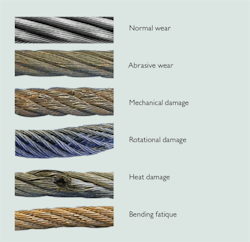Ask the Expert: When should lift cables be replaced?
Question: When should lift cables be replaced?
Answer:
All lifting cables should be replaced every three to five years or when damage is visible. Does that mean every cable that looks “less than brand new” after a couple of years of heavy use should be replaced? Not necessarily.
A little wear is to be expected over time. A good rule of thumb is if over the course of a single day, you see six random wires sticking out over the length of a single cable (when examining all strands), the entire cable should be replaced. Additionally, if you see three broken wires in just a single strand over the course of a day, you need to replace the entire cable.
Likewise replace cables that have worn down by 10 percent of their original size. For example, if the cable was originally .5" in diameter, replace it once it reaches .45". While the difference may seem small, a 14,000-lb rated cable that loses 10 percent tensile strength will subsequently be rated at just 12,600 lbs. This is a significant reduction in capability when it comes to lifting heavy duty vehicles.
Cables should also be replaced if they are pitted by corrosion or if there is evidence of kinking, crushing, cutting, bird-caging, a popped core, or heat damage.
If you find damaged cables meeting any of these criteria, replace them immediately. Do not use the lift until the damaged cables have been replaced.
Information provided by BendPak, Inc.
